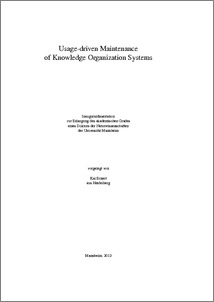|
Usage-driven Maintenance of Knowledge Organization Systems
Eckert, Kai
![[img]](https://madoc.bib.uni-mannheim.de/31754/2.hassmallThumbnailVersion/dissertation-eckert.pdf)  Vorschau |
|
PDF (Dissertation Kai Eckert)
dissertation-eckert.pdf
- Veröffentlichte Version
Download (8MB)
|
|
URL:
|
https://ub-madoc.bib.uni-mannheim.de/31754
|
|
URN:
|
urn:nbn:de:bsz:180-madoc-317542
|
|
Dokumenttyp:
|
Dissertation
|
|
Erscheinungsjahr:
|
2012
|
|
Ort der Veröffentlichung:
|
Mannheim
|
|
Verlag:
|
Universität Mannheim
|
|
Hochschule:
|
Universität Mannheim
|
|
Gutachter:
|
Stuckenschmidt, Heiner
|
|
Datum der mündl. Prüfung:
|
15 Juni 2012
|
|
Sprache der Veröffentlichung:
|
Englisch
|
|
Einrichtung:
|
Fakultät für Wirtschaftsinformatik und Wirtschaftsmathematik > Practical Computer Science II: Artificial Intelligence (Stuckenschmidt 2009-)
|
|
Fachgebiet:
|
004 Informatik
|
|
Normierte Schlagwörter (SWD):
|
Wissensorganisation , Visualisierung , Informations- und Dokumentationswissenschaft
|
|
Freie Schlagwörter (Englisch):
|
Knowledge Organization System , Maintenance , Usage , Statistics , Visualization
|
|
Abstract:
|
Knowledge Organization Systems (KOS) are typically used as background knowledge
for document indexing in information retrieval. They have to be maintained
and adapted constantly to reflect changes in the domain and the terminology. In
this thesis, approaches are provided that support the maintenance of hierarchical
knowledge organization systems, like thesauri, classifications, or taxonomies, by
making information about the usage of KOS concepts available to the maintainer.
The central contribution is the ICE-Map Visualization, a treemap-based visualization
on top of a generalized statistical framework that is able to visualize almost
arbitrary usage information. The proper selection of an existing KOS for available
documents and the evaluation of a KOS for different indexing techniques by means
of the ICE-Map Visualization is demonstrated.
For the creation of a new KOS, an approach based on crowdsourcing is presented
that uses feedback from Amazon Mechanical Turk to relate terms hierarchically.
The extension of an existing KOS with new terms derived from the documents
to be indexed is performed with a machine-learning approach that relates
the terms to existing concepts in the hierarchy. The features are derived from text
snippets in the result list of a web search engine. For the splitting of overpopulated
concepts into new subconcepts, an interactive clustering approach is presented that
is able to propose names for the new subconcepts.
The implementation of a framework is described that integrates all approaches
of this thesis and contains the reference implementation of the ICE-Map Visualization.
It is extendable and supports the implementation of evaluation methods
that build on other evaluations. Additionally, it supports the visualization of the
results and the implementation of new visualizations. An important building block
for practical applications is the simple linguistic indexer that is presented as minor
contribution. It is knowledge-poor and works without any training.
This thesis applies computer science approaches in the domain of information
science. The introduction describes the foundations in information science; in the
conclusion, the focus is set on the relevance for practical applications, especially
regarding the handling of different qualities of KOSs due to automatic and semiautomatic
maintenance.
|
|
Übersetzter Titel:
|
Nutzungsgetriebene Pflege von Wissensorganisationssystemen
(Deutsch)
|
|
Übersetzung des Abstracts:
|
Wissensorganisationssysteme (Knowledge Organization Systems, KOS) werden
üblicherweise als Hintergrundwissen im Information Retrieval zur Indexierung von
Dokumenten genutzt. Sie müssen kontinuierlich gepflegt und angepasst werden,
um Änderungen im Fachbereich und der verwendeten Terminologie widerzuspiegeln.
In dieser Arbeit werden Verfahren vorgestellt, die die Pflege von Wissensorganisationssysteme,
wie Thesauri, Klassifikationen oder Taxonomien, unterstützen,
indem sie dem Bearbeiter Informationen zur Nutzung der KOS-Konzepte zur Verfügung
stellen.
Der Hauptbeitrag ist die ICE-Map Visualization, eine Treemap-basierte Visualisierung,
die auf einem generalisierten statistischen Framework aufbaut. Sie kann
nahezu beliebige Nutzungsinformationen visualisieren. Die passende Auswahl
eines existierenden KOS für vorhandene Dokumente und die Bewertung eines KOS
für verschiedene Indexierungstechniken mittels der ICE-Map Visualization wird
gezeigt.
Für die Erstellung eines neuen KOS wird ein Crowdsourcing-Ansatz vorgestellt,
der Feedback von Amazon Mechanical Turk nutzt, um Terme in eine hierarchische
Beziehung zu setzen. Die Erweiterung eines existierenden KOS mit neuen Termen
wird mittels eines Maschinenlernverfahrens durchgeführt, das die Terme zu
Konzepten im KOS in Bezug setzt. Als Merkmale werden dabei Textfragmente aus
der Ergebnisliste einer Websuchmaschine genutzt. Für die Aufteilung überfüllter
Konzepte in neue Unterkonzepte wird ein interaktiver Clusteringansatz präsentiert,
der auch Namensvorschläge für die neuen Konzepte generiert.
Ferner wird die Implementierung eines Frameworks beschrieben, das alle Ans
ätze integriert und die Referenzimplementierung der ICE-Map Visualization beinhaltet.
Es ist erweiterbar und unterstützt die Implementierung von neuen Evaluationsmethoden,
die auf vorhandenen Evaluationen aufbauen. Die Visualisierung
der Ergebnisse, sowie die Implementierung neuer Visualisierungen wird unterstützt.
Ein wichtiger Baustein für praktische Anwendungen ist der einfache linguistische
Indexer, der als Nebenbeitrag vorgestellt wird. Er kommt ohne vorbereitendes
Training aus.
Diese Arbeit wendet Ansätze aus der Informatik im Bereich der Informationswissenschaften
an. In der Einleitung werden die relevanten Grundlagen aus der
Informationswissenschaft vorgestellt und in der abschließenden Zusammenfassung
auf die Relevanz für praktische Anwendungen eingegangen, insbesondere, was den
Umgang mit verschiedenen Qualitäten von KOSs angeht, die aus automatischer
oder halbautomatischer Pflege resultieren.
(Deutsch)
|
 | Das Dokument wird vom Publikationsserver der Universitätsbibliothek Mannheim bereitgestellt. |
 Suche Autoren in Suche Autoren in
BASE:
Eckert, Kai
Google Scholar:
Eckert, Kai
Sie haben einen Fehler gefunden? Teilen Sie uns Ihren Korrekturwunsch bitte hier mit: E-Mail
Actions (login required)
 |
Eintrag anzeigen |
|
